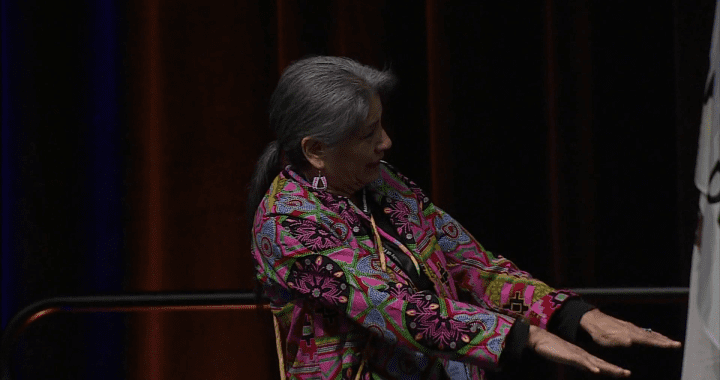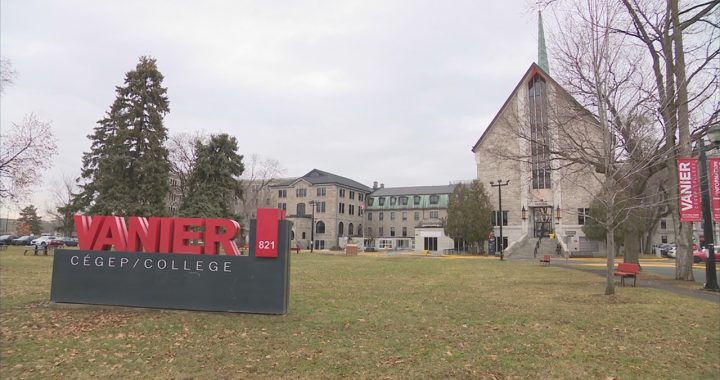A spokesperson for the Mohawk Mothers, or Kahnistensera, says the group feels pushed aside in the search for unmarked graves on a site owned by Société Québécoise des Infrastructures, or SQI. McGill says it leases part of the property.
“The process can no longer by any means be considered Indigenous-led, as the SQI and McGill attempt to control the whole process, reducing the role of Indigenous people to performing ceremonies on the site,” said Kahentinetha, one of the Mothers who added that they feel blindsided by the communications that happened without consulting them.
Quebec’s infrastructure society, or SQI, and McGill both put out statements on Aug. 3 saying nine potential gravesites were identified through ground penetrating radar, or GPR, without consulting the Kahnistensera.
They excluded the information that, according to Geoscan’s report, “It is possible that some of the unknown features may be unmarked graves, particularly in the case of older burials without coffins and also possibly child-size graves.”
Kahentinetha said that the archeologists on-site have been very informative, but there’s often a delay in the mothers receiving important reports.
“The only way we can find out is to be right there, because we are not told and I don’t know why the material goes to them, and then they distribute it in the way they want and eventually we get a copy of it,” she said. “It seems like this is violating the court order.”
They were present on-site when archeologists also dug up a woman’s dress and a pair of children’s shoes, the style dating back to around the 1940s.
But the archeologist panel appointed in the settlement agreement said that they need to appoint a forensic specialist to handle these items, something the SQI has refused, said researcher Philippe Blouin.
“That has been refused now, officially, even though it was a recommendation from the panel, and their recommendations are supposed to be binding, as per the settlement agreement. It’s been refused by the SQI,” he said.
In an email statement to APTN News, the SQI stated that a bioarcheologist is present when archeological works are underway – but did not say whether they were trained in handling potentially criminal evidence.
“The dress was found just a few inches inside the ground and then put in a plastic bag but it has to be a tamper-proof bag for it to stand in a criminal court. There are many chances that it is possible that this comes to a criminal court and this chain of custody has to be preserved for this prosecution to be successful,” said Blouin.
Blouin said they also have left partially covered piles of dirt to sit in the rain since July 25 that was dug up where sniffer dogs detected the scent of human remains in early June.
“The piles have not been sifted through, and that was also a recommendation from the panel that was not respected by the SQI to sift through these piles that were extracted from the site where the search dogs sniffed a target to sift through them immediately because the human remains could be inside these piles.”
Kahentinetha said that in the midst of these recommendations being ignored, “Despite publicly stating their support for the process and commitment to reconciliation, McGill and SQI have unilaterally deemed the panel’s mandate terminated.”
This would mean that archeological works would continue with the firm Ethnoscope, but they would be guided by McGill and SQI, rather than a panel of expert archeologists. The SQI stated that the archeologist’s panel had the mandate to submit two reports of recommendations, one being submitted on May 8 and the other on July 17. The SQI said they were “very satisfied by and grateful for the work accomplished by the experts.”
The settlement agreement states, “SQI, McGill and the Kanien’keha:ka Kahnistensera agree to be bound by the recommendations of the Panel as to the Techniques and agree to be guided by the recommendations of the Panel as to the specialists to carry out the techniques and analyse the relevant data, but McGill and SQI retain discretion to retain other providers with the appropriate qualifications and expertise if the circumstances warrant.”
The Kahnistensera also don’t want to return to work until they have mohawk security guards after a security guard appointed by a private company hired by SQI kicked them off the grounds on July 25.
“We need to have our own people to do the security. and we do have a group in Kahnawake ready to come and do it, and we’re working on bringing them in.”
Archeological digs have been suspended since that incident.
The SQI and McGill both said that dialogue is underway with the Kahnistensera. In an email statement to APTN, the SQI did not say whether they’d hire a Mohawk security form, but said the agents assigned to the site would receive “awareness training about Indigenous realities including a portion on residential schools and missing children” as well as “a specific training on Mohawk culture provided by the Mothers.”
The Kanistensera and their allies are prepared to return to court if the SQI and McGill continue to breach the settlement agreement.
Editor’s Note: This story was updated on Aug. 7, 2023 to reflect that McGill leases some of the property owned by SQI.










